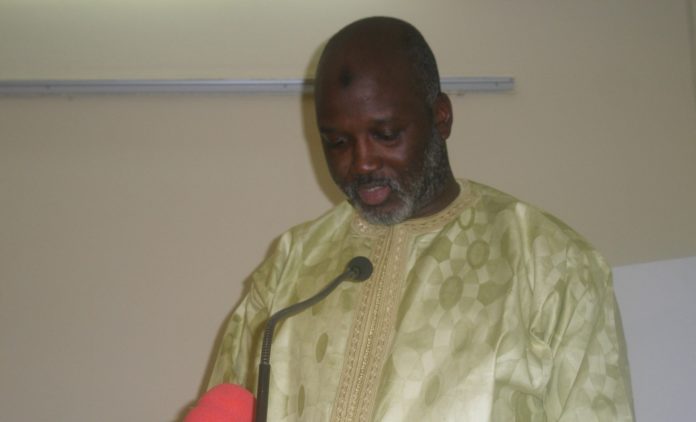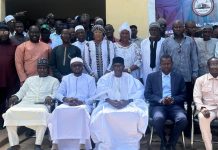By Momodou Jarju
Debate ensued after the second reading of the Anti-Corruption Bill 2019 by the Attorney General and Minister of Justice, Abubacarr Tambadou at the National Assembly on Tuesday 3rd December, 2019.
Minister Tambadou and several members of the National Assembly pointed out fighting poverty as the main device to reduce corruption in the country.
Members took turn to comment and asked questions for clarification from the Justice Minister Tambadou, while many speakers agreed that the bill is long overdue.
Several members, however, have also expressed their fears on the implementation of the Bill, saying The Gambia has many good laws but at the end of the day, implementation is a problem.
Tambadou said the principal tool to fight against the root causes of corruption is fighting poverty and once people realise that, half of the job would be done.
“But there is nothing like a corrupt free society, nowhere,” he said in response to a question asked by NAM for Serrekunda Halifa Sallah.
NAM for Serrekunda, Halifa Sallah said before people talk about corruption, they must ensure justice prevails, while pointing out the difficulty someone earning D1500 faces.
He said there is need to build an institution around the architecture of the existing structures of the state of oversight of the auditing institutions, which would alternatively build up integrity.
He said people must build a new mindset and support the suggestion of public officials to declare their assets.
With these in place, Sallah said, “we will see that the existing structures would be reinforcing each other until we build a foundation pillar of justice whilst we struggle with our economic realities to increase wages, knowing the problems of people; so that gradually we build a society that is better suited to address the needs and aspiration of our people.”
In response to NAM for Serrekunda, Minister Tambadou said there is the need to strengthen existing frameworks, such as the code of conduct for public officers.
“I absolutely agree with him that those need to be strengthened but it does not mean that we cannot also explore other mechanisms that could complement the code of conduct, particularly mechanisms that seek to enforce through the criminal process corrupt practices,” he said.
He said the sanctions that are provided under the code of conduct for public officers are civil.
“But when you have the threat of the use of the criminal sanctions, then perhaps it would aid in the deterrence of corrupt practices. So the two can go together, they are complementary in my view.”
Minister Tambadou said they would provide the NAM with a metrics that they have created to demonstrate the difference between the old Act and the new Act in detail.
Tambadou further said what the new bill seeks to do principally is to provide more independence to the Anti-Corruption Commission to give greater powers, particularly investigative powers including more latitude for investigative techniques.
“It creates the offence in respect of private sector corruption and above all among other things, it creates protection for whistleblowers. These are some of the very new additions that this bill introduces which were not included in the previous bill,” he said.
In response to the question of NAM for Wuli East Suwaibou Touray, on whether there are anti-money laundering provisions, Tambadou said the bill does not contain a lot of offences but some new provisions that relate strictly to anti-corruption related crimes.
Tambadou said this however does not stop the commission from looking at other offences contained elsewhere in the laws of the country.
“Anti-money laundering is contained in the Anti-Money Laundering Act and nothing stops them from relying on those provisions so long as it falls within their jurisdiction,” he said.
On the question of Upper Saloum NAM, Alhagie Mbowe, on the mechanisms of protecting whistleblowers and method of reporting a corrupt practice, Tambadou responded in the affirmative, saying there are processes and procedures on the confidentiality of information that would be communicated to the commission.
He also said there are mechanisms on reporting or making complaints to the commission.
“And the commission as a responsible body will look at the complaint and decide on its own on whether it requires further investigation, action or not,” he said.
He said a lot of sensitization and awareness raising activities are needed to ensure this succeeds, while adding that he does share the concerns of some of the NAMs on the issue of implementation.
He added that “as far as I am concerned and as far as the Government is concerned while having these laws in place, is important first step, the more important part of this process is the caliber of people that are entrusted with these activities.”
Banjul South NAM, Fatoumatta Njai, emphasized that the declaration of assets should be considered on the Bill and that it should go hand in hand with the Access to Information Bill to ensure its success.
Demba Sowe, Niamina West NAM, also agreed with Sallah’s comment on fighting for justice in order to fight corruption. He called for total scrutiny of the staff that would be employed to constitute the anti-corruption commission if not the law would be meaningless.
Brikama South NAM Lamin J. Sanneh shared his concerns on the sensitization of the bill so that everyone should be aware of it. He recommended that this be considered.
Speaker Mariam Jack Denton said: “The Bill is hereby referred to the Assembly’s business committee for committal to the relevant National Assembly committee.”



















